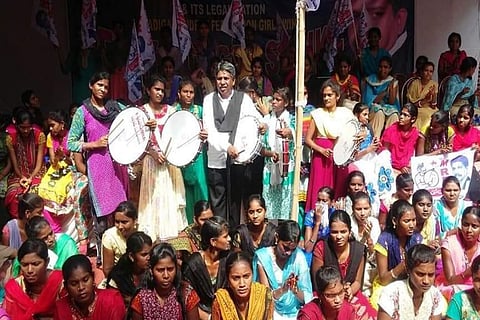

A week ago, on August 27, a five-member bench of the Supreme Court made a significant observation, which was celebrated by several Dalit community members. The apex court held that states have the power to sub-classify Scheduled Castes (SC) and Scheduled Tribes (ST) to provide preferential treatment to the “weakest among the weak,” in contrast to the 2004 SC judgment on the same issue.
The bench, comprising Justices Arun Mishra, Indira Banerjee, Vineet Saran, MR Shah and Aniruddha Bose, said that the 2004 judgment needed to be reconsidered.
“It’s clear that caste, occupation, and poverty are interwoven. The state cannot be deprived of the power to take care of the qualitative and quantitative difference between different classes... to take ameliorative measures,” Justice Mishra said in the judgment.
While the judgment on the issue is still pending, as it has been referred to a seven-judge bench, the Madiga Reservation Porata Samithi (MRPS) and other social justice activists are optimistic that the judgment would allow categorisation, a long-held demand of the Madigas and other SC communities.
MRPS, a political outfit led by Manda Krishna Madiga, was in the forefront of the agitations in the erstwhile Andhra Pradesh for more than two decades, seeking justice to other underrepresented SC communities. Besides the demand being supported by several progressive intellectuals, it also found popular support from politicians like Telangana Chief Minister K Chandrasekhar Rao and the BJP-led union government. For the cause, Manda Krishna Madiga even launched a fast unto death protest in 2008.
Welcoming the latest decision of the Supreme Court, MRPS said in a statement: “The judgment comes as a relief to members of thousands of subcastes among SCs who have not been able to avail reservation in independent India in spite of being eligible. For social justice, equal distribution, and the spirit of the constitution, this verdict is a shining example.”
MRPS maintains that members of a certain community have enjoyed reservations disproportionate to their population representation while other vulnerable communities continue to be grossly underrepresented.
Struggle for sub-categorisation
The campaign for sub-categorisation started in the Telugu states with MRPS in 1994 in Prakasam district and soon spread to the entire state of united Andhra Pradesh. Following agitations, in 1996, the then government appointed a Commission of Inquiry headed by Justice P Ramachandra Raju.
After gathering statistical data on the reservations, the Commission found that there was disproportionate distribution of reservation benefits in favour of the Mala and the Adi Andhra groups of SC communities compared to their respective populations, and that both the Madiga and Relli communities were inadequately represented in both public appointments and educational institutions.
“The Justice P Ramachandra Raju Commission and the subsequent Usha Mehra Commission pointed out the fact that only Malas are over-represented in reservations. Hence, it’s only justifiable that other communities too are given the same opportunity,” said Govindhu Naresh Madiga, a representative from MRPS.
In 2007, based on the recommendation of the Cabinet Committee on political affairs, fomer retired judge Usha Mehra headed a Commission to examine the issue of sub-categorization of Scheduled Castes in Andhra Pradesh.
In Telangana and AP, there are 59 castes and sub-castes in the SC notified list. “The findings of the Usha Mehra Commission stated that out of the 36 castes surveyed, only 15 are employed in government jobs, the others were totally absent in that sector. So, we’ve been fighting for long and demanding justice. The Supreme Court needs to expedite the judgment and fulfil the wishes of the invisible communities,” Govindhu said.
The Mala community raised objections to the sub-categorisation in united Andhra Pradesh, arguing that the categorisation would fuel communal and social hatred and that micro-level social justice is not possible through reservation. They claimed that categorisation was a political ploy to destroy unity among SCs.
After sub-categorisation was implemented for a period of four years between 2001-2004 in erstwhile Andhra Pradesh, the Supreme Court in 2004 said that states do not have power to further sub-classify the Scheduled Castes and Scheduled Tribes for reservations.
“Except some misguided people from the Mala community, all the anti-caste intellectuals like Marroju Veeranna, U Sambasiva Rao and several others have been striving for it,” said Pasunoori Ravinder, a Dalit PhD scholar from Telangana. Ravinder added, “Allowing sub-classification is actual social justice and following the principles of Dr Babasaheb Ambedkar.”
Though there has been no opposition to the SC’s recent judgment, Professor K Laxminarayana from the University of Hyderabad cautioned that Dalit and Bahujan communities should not be manipulated for their sincere faith in social justice.
In the judgment, Justice Mishra said, “Citizens cannot be treated to be socially and educationally backward till perpetuity; those who have come up must be excluded like the creamy layer.”
“Any judgment that asks a particular SC caste to be declared a ‘creamy layer’ is nothing but the path to doing away with reservations. Reservation is not a poverty alleviation programme. These communities have been socially excluded for thousands of years and now you want to declare them ‘creamy layer’?” Laxminarayana remarked.